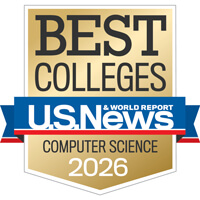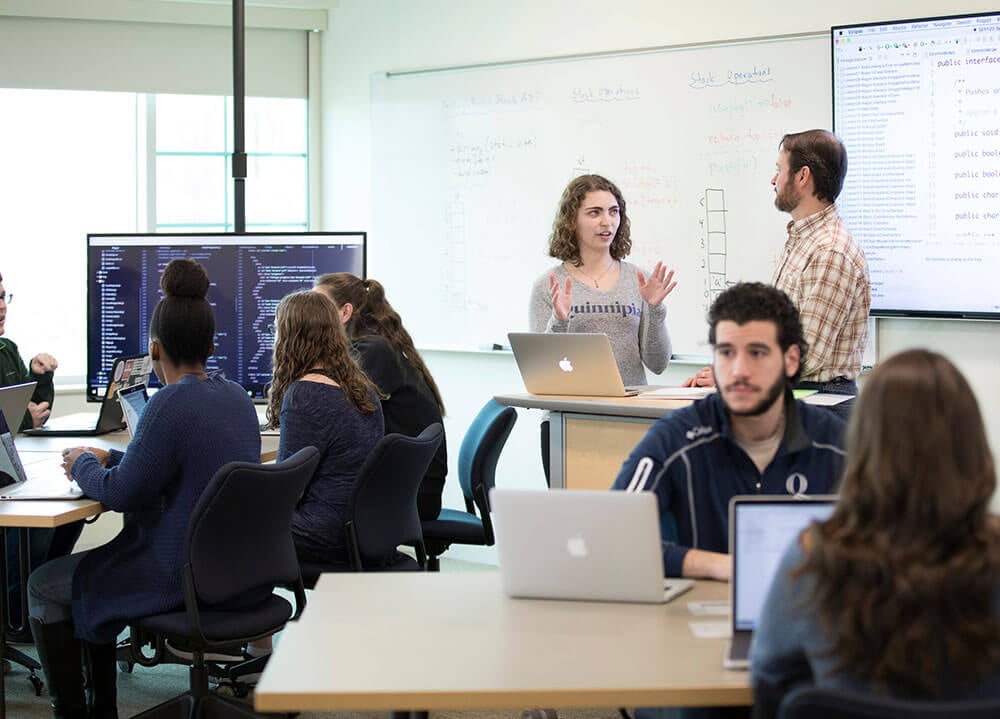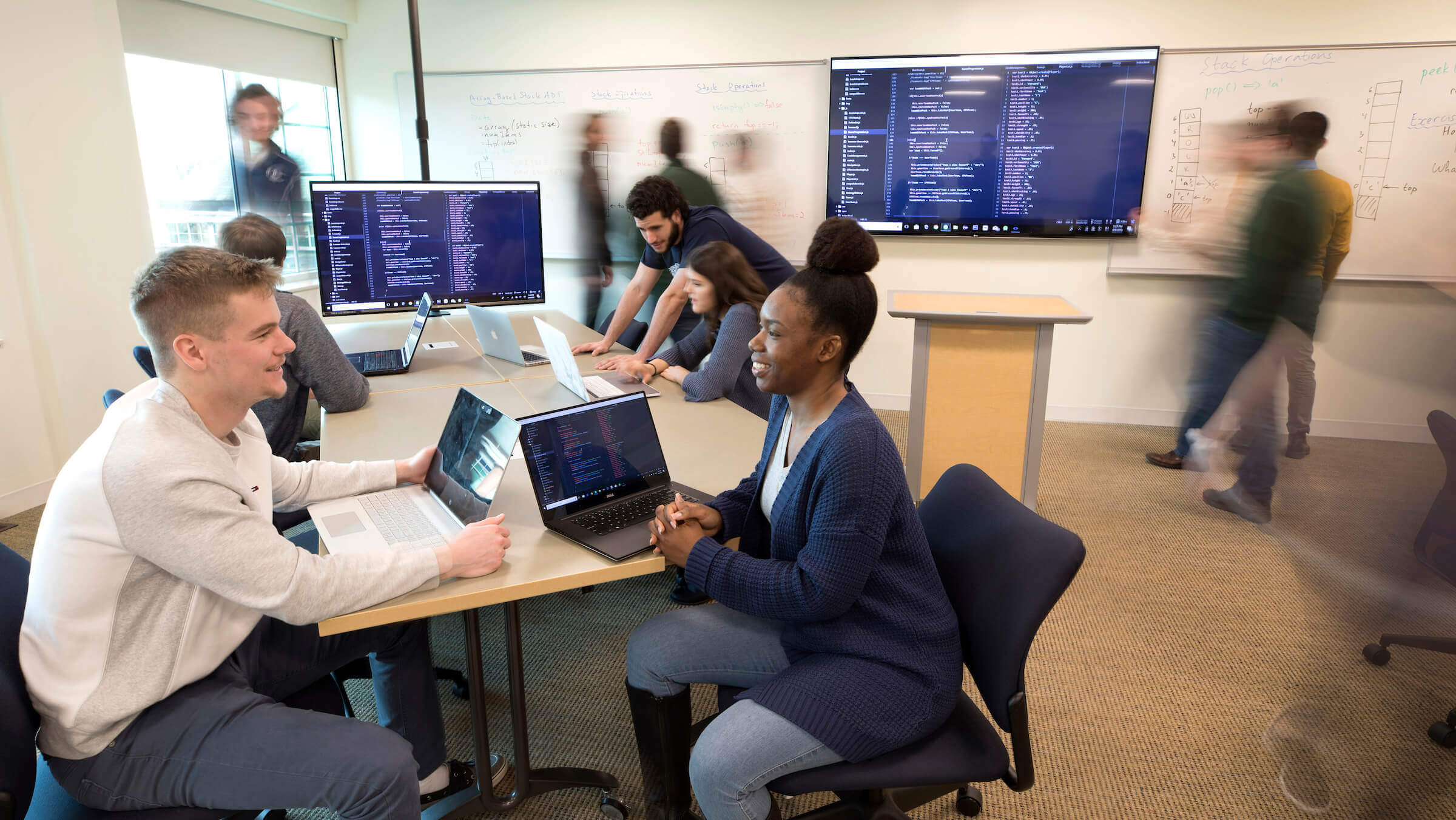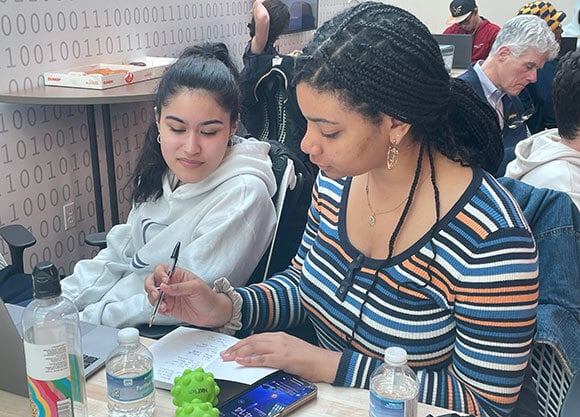
Best Computer Science Programs
U.S. News & World Report


Areas of Interest

Areas of Interest
Do you see yourself mining big data to increase a Fortune 500 company’s revenue, or rebuilding their internal database and protecting their sensitive information from cyberattacks? Maybe you dream of designing video games, innovative mobile apps or dynamic and engaging websites that help address the health and environmental challenges of our time. Whatever your passions and interests may be, our computing programs will provide you with a world-class education that prepares you for many complex and constantly evolving — and rewarding — roles.
Employment of information security analysts is projected to grow 33 percent from 2021 to 2031. (U.S. Bureau of Labor Statistics, 2022)
Number of new computer and information technology occupations projected to be created from 2022 to 2032. (U.S. Bureau of Labor Statistics, 2023)
National average pay for cybersecurity professionals (U.S. Bureau of Labor Statistics, 2022).

Careers in computing and information technology continue to experience tremendous growth, outpacing nearly every other profession. Our diverse lineup of computing-based academic programs — from computer science to cybersecurity and everything in between — places you at the forefront of that growth, unlocking nearly endless career pathways. If you’re interested in becoming a software developer, video game designer, UX specialist or information security expert, we have the program for you.
On the other hand, if you aren't sure what program is right for you just yet, Computing 360 enables incoming students to sample various areas of study before they declare a major. After getting an idea of what to expect as a computer science, data science, software engineering or game design and development major, students can easily select the discipline that best matches their interests and long-term career goals. With the help of dedicated academic advisers and career services staff, students have the freedom and support they need to navigate courses and forge the right pathway to success beyond the classroom.
This research paper is published in the 2023 IEEE 13th Annual Computing and Communication Workshop and Conference (CCWC).
The IoT market is continuously expanding, and security measures parallel to the growing industrialization has drawn the research community’s attention. While several works have focused on the different technologies used to protect IoT devices, this paper aims to narrow the focus to Blockchain and Artificial Intelligence (AI) solutions for security and privacy issues faced by these devices. These technologies address two major vulnerabilities with edge devices on IoT networks: centralization and weak edge nodes. Blockchain provides a distributed system that can help avoid a single-point failure and can be used to optimize battery life on low-level devices by load balancing. On the other hand, AI’s power to learn and adapt is critical to automate systems and make them intelligent enough to analyze collected data. The combination of these two technologies is capable of mitigating multiple challenges IoT architectures face currently. The paper discusses the latest major architectures that integrate Blockchain and AI to enhance security within the. This paper also presents the comprehensive take on the device security and drawbacks to these mechanisms. This work also addresses the future of security in IoT and suggests different areas that need further work to better comprehend how the combination of these technologies can assist in enhancing security.
Authors: Hephzibah Rajan ’23, John Burns ’23 and Professor Chetan Jaiswal
With programming becoming an ever-growing field, the number of readily available online learning tools is skyrocketing. One popular style of application designed to teach users how to program includes the use of code-blocks – predefined code snippets contained in a high-level description that the user can interact with and assemble in various ways to achieve programmatic results. A crucial drawback of most code-block applications is that they rarely demonstrate how an assembled arrangement of blocks translates to code in any modern programming language, which drastically limits the applicability of learned knowledge. Our application prototype, Junkademy, aims to bridge this gap by translating user-assembled code-blocks into syntactically correct Java code in real-time. This principal feature will peel back a layer of abstraction found in similar educational applications to benefit users as they attempt to write code because they will be familiar with one of the most popular programming languages worldwide.
Student Team Members: James Gonsalves, John Theall, MacArthur Mills
Adviser: Professor Chetan Jaiswal
Client: Professor Jonathan Blake
The sports training industry is valued at $11 billion and growing, with part of that capital being exchanged through coaching and personal training. Our product aims to be an economical alternative by allowing people to train on their own with machine-learning models. Using just one camera, our product can accurately detect the movement of joints in real time. With the help of the machine-learning solution Mediapipe, we can assist people with many types of exercises and sports. We aim to provide a product that can be used in any space with a UI that is simple to use. Our product offers features that help users easily identify their movements by overlaying a motion capture “skeleton” on the subject. This drawn skeleton updates with the subject’s movements. Through this comparison, we can give users examples of how to correctly perform the exercises and sports form demonstrated by our models.
Student Team Members: Thomas Eckert, Yadel Negash
Adviser: Professor Chetan Jaiswal
Client: Quinnipiac University Recreation and Wellness Center
MindBellows is an Android app that uses Java, Android Studio, GitHub and SQL to test and improve the mental aptitude of users. The app tests users in five different categories: general IQ questions, memory, logical thinking, pattern matching and reaction time. Users can take a full-spectrum test with every category, or they can take a test in one category. Each category is based on 20 points. A full-spectrum test is based on 100 points and impacts the scoring of all five categories. Depending on how well the user does, the app gives questions on an assigned difficulty scale: novice (0-5 points), intermediate (6-10 points), advanced (11-15 points) and expert (16-20 points). A full-spectrum test will scale its difficulty based on the average of the user’s five scores. The app will also try to encourage the user to try questions that are outside their difficulty range, allowing for gradual improvement.
Student Team Members: Michael Tambascio, Loki Simeon
Adviser: Professor Chetan Jaiswal
Client: Paul C. LoCasto, Ph.D., Professor & Chair, Department of Psychology
The impacts of global warming and climate change are being felt all around the world. At Quinnipiac, our team strives to understand the effects of the Urban Heat Island (UHI), a major factor in climate change. Our project, Sink and Source, consists of three layers: data collection, data processing, and data display. Data collection involves the use of IoT devices that have been strategically placed in eight locations around Quinnipiac’s Mount Carmel’s campus. The results are displayed as z-values and p-values, which help identify the spatial clustering of high and low heat by comparing the temperature of an area to its neighboring area’s temperature. A publicly accessible website will display the data in a user-friendly manner with the assistance of Angular.js in the front-end. Our team will present the finalized data to Quinnipiac’s sustainability committee in an effort to assist with future infrastructure plans and create a more eco-conscious campus.
Student Team Members: Caprice Williams, John Burns, Hephzibah Rajan
Adviser: Professor Chetan Jaiswal
Our project focuses on creating an improved course planning and advising website for Quinnipiac students and faculty. Our project looks to improve the current advising and course planning website in use by the university. The current system for advising and choosing classes is half on paper and half online. Our goal is to streamline this process and make it easy for students to understand the courses they need to take and to make educated registration decisions. Our system is a client/server website using AngularJS as the front end of the website. Users can access an interactive GUI that sends information and commands to the back end of the application. Our back end is run on Java using Spring Boot and can handle the requests coming from the front end. The backend uses Hibernate to retrieve information from the database. Our database is a MySQL database running a Google Cloud Platform.
Student Team Members: Peter Sabio, Jordan Mayo
Adviser: Professor Chetan Jaiswal
Client: Quinnipiac University Office of the Registrar

Programs
Showing 0 Programs
BS
On Campus
BS
On Campus
BS
On Campus
BS
On Campus
BA or BS
On Campus
BS
On Campus
BA
On Campus
BS
On Campus
Minor
On Campus
Minor
On Campus
Minor
On Campus
Minor
On Campus
Minor
On Campus
Minor
On Campus
Accelerated Dual-Degree
On Campus
Accelerated Dual-Degree
On Campus
Accelerated Dual-Degree
On Campus
Dual-Degree
On Campus
Dual-Degree
On Campus
Dual-Degree
On Campus
MS
Online or On Campus
MS
On Campus
MS
Online
MS
On Campus
MS
On Campus
BS
On Campus
BS
On Campus
BS
On Campus
BS
On Campus
BA or BS
On Campus
BS
On Campus
BA
On Campus
BS
On Campus
Accelerated Dual-Degree
On Campus
Accelerated Dual-Degree
On Campus
Accelerated Dual-Degree
On Campus
MS
Online or On Campus
MS
On Campus
MS
Online
MS
On Campus
MS
On Campus
We've sorted each of our undergraduate, graduate and doctoral programs into 16 unique Areas of Interest. Explore these categories to discover which programs and delivery methods best align with your educational and career goals. As you browse each program, you will learn more about what to expect as a student here at Quinnipiac — from our state-of-the-art facilities and workspaces to the career development and academic advising resources at your disposal.
Our graduate and undergraduate admissions representatives are here to answer any questions you may have and help you navigate the application process.